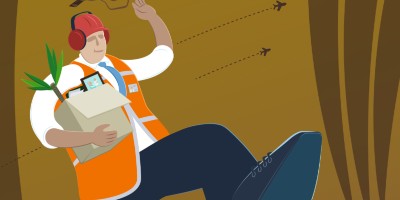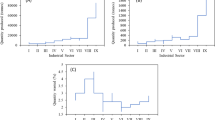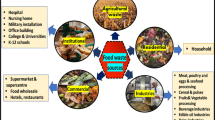Abstract
Meat consumption of all types is a major contributor to climate change and other environmental problems, but poultry and fish and aquatic invertebrates have lower environmental impacts than most other meats. To evaluate whether the growth in consumption of lower-impact meats has suppressed other meat sources, I analysed cross-national panel data for 1961–2013. I found that the increased consumption of poultry and fish and aquatic invertebrates has not suppressed the consumption of other meat sources.

Similar content being viewed by others
Data availability
As noted in the Methods section, the source data can be downloaded from the following links: https://ourworldindata.org/meat-production, https://ourworldindata.org/seafood-production and https://databank.worldbank.org/reports.aspx?source=world-development-indicators. The dataset constructed from these sources is available from the author upon request. Figure 1 is based on data downloaded from Our World in Data6,7.
Code availability
No special code is needed for the analyses. The STATA commands used for the analyses are presented in the Methods section. The STATA do-file is available from the author upon request.
References
Meat Eater’s Guide to Climate Change and Health: Lifecycle Assessments: Methodology and Results (Environmental Working Group, 2011).
Ritchie, H. & Roser, M. Environmental Impacts of Food Production (Our World in Data, 2020); https://ourworldindata.org/environmental-impacts-of-food
York, R. Do alternative energy sources displace fossil fuels? Nat. Clim. Change 2, 441–443 (2012).
Longo, S. B., Clark, B., York, R. & Jorgenson, A. K. Aquaculture and the displacement of fisheries captures. Conserv. Biol. 33, 832–841 (2019).
York, R. Why petroleum did not save the whales. Socius https://doi.org/10.1177/2378023117739217 (2017).
Ritchie, H. & Roser, M. Meat and Dairy Production (Our World in Data, accessed 14 December 2019); https://ourworldindata.org/meat-production
Ritchie, H. & Roser, M. Seafood Production (Our World in Data, accessed 14 December 2019); https://ourworldindata.org/seafood-production
Food Balances (UN FAO); http://www.fao.org/faostat/en/?#data/FBSH
World Development Indicators (World Bank, accessed 16 December 2019); https://databank.worldbank.org/reports.aspx?source=world-development-indicators
Pauley, D. & Zeller, D. Catch reconstructions reveal that global marine fisheries catches are higher than reported and declining. Nat. Commun. 7, 10244 (2016).
Author information
Authors and Affiliations
Contributions
R.Y. conceived the study, performed the analyses and wrote the paper.
Corresponding author
Ethics declarations
Competing interests
The author declares no competing interests.
Additional information
Publisher’s note Springer Nature remains neutral with regard to jurisdictional claims in published maps and institutional affiliations.
Supplementary information
Supplementary Information
Supplementary Tables 1A–3C.
Rights and permissions
About this article
Cite this article
York, R. Poultry and fish and aquatic invertebrates have not displaced other meat sources. Nat Sustain 4, 766–768 (2021). https://doi.org/10.1038/s41893-021-00714-6
Received:
Accepted:
Published:
Issue Date:
DOI: https://doi.org/10.1038/s41893-021-00714-6
- Springer Nature Limited
This article is cited by
-
Reinventing the meal: a genealogy of plant-based alternative proteins
Agriculture and Human Values (2023)
-
Cellular agriculture will reinforce power asymmetries in food systems
Nature Food (2022)





